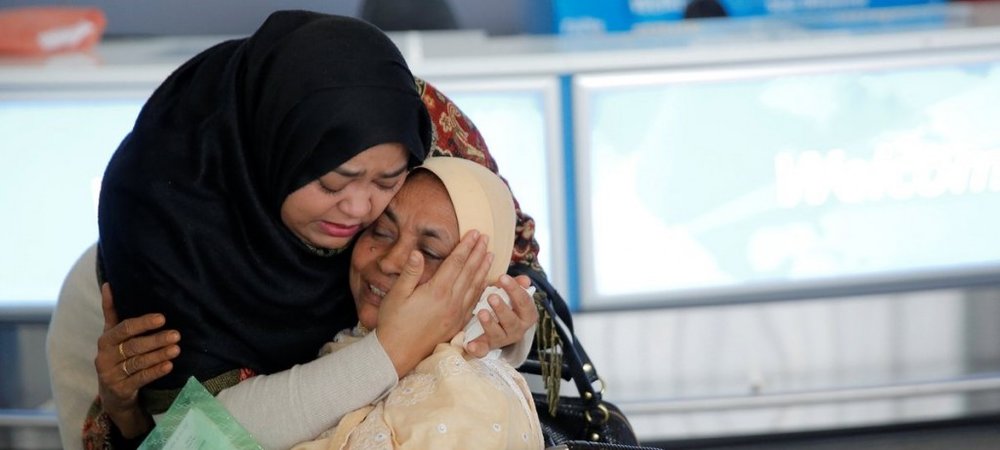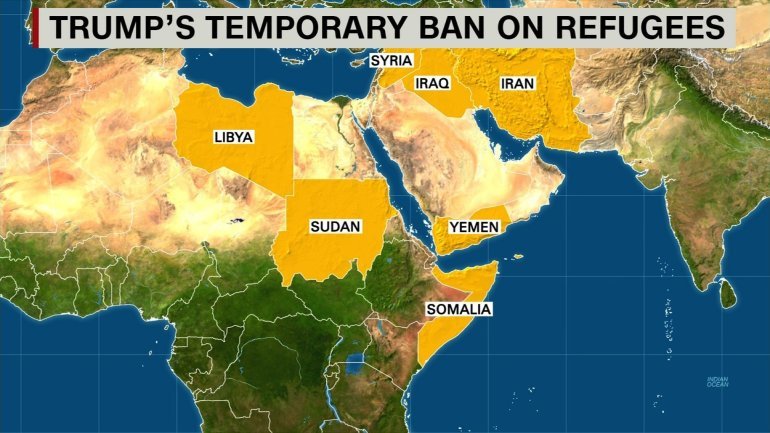
Donald Trump’s Immigration Ban

Since President Donald Trump has sworn his oath, he has been diligently signing several executive orders that have been causing major changes in the U.S. One of the most controversial executive orders is the immigration ban that he signed last week.

Based on the order, people that came from seven predominantly Muslim countries are banned from entering the country for 90 days, which includes Syria, Yemen, Iran, Iraq, Libya, Somalia, and Sudan. In addition, it also states that refugees are banned for 120 days, while those from Syria are banned indefinitely. As a result, it gained several responses and movements against the order. According to several reports, many Muslim have already been onboard while Trump signed the order. Thus, all of them were put detained in the airport and can’t be reunited with their families. But before we discuss the consequences of this order, let’s take a detailed look of it.
Totally barred
-
Visitors or business travelers

If you are a tourist or simply conducting a business with non-immigrant travel visas like B-1 or B-2 then you can’t enter the country.
-
International students and their families
They are those who hold non-immigrant visas like F-1, J-1, and M-1. Based on the data of Institute of International Education, there are 17,354 international students from the seven barred countries. All of them are currently enrolled in different American institutions for the school year 2015 – 2016. As a result, Princeton University and other schools warned international students from leaving the country because they won’t be able to re-enter.
-
Temporary workers and their families
Employees that hold non-immigrant work visas like H-1 B for specialty workers and H-2B for agricultural workers are the ones who are affected by the order. Thus, we can imagine that farms will be having a hard time looking for replacement workers during the harvesting season.
-
Fiancés of U.S. citizens
This is only applicable to those who have pending immigrant visas for the fiancés and for spouses and children of U.S. citizens or green card holders. Therefore, it means that these families won’t be able to stay together. The sad thing is that even the children are affected by the order.
-
New immigrants
Those who are arrived in the U.S. and were issued with immigrant visas based on employment or family status were also banned. From these seven countries, there are 52,365 green cards issued in 2015. A green card is issued to immigrant visa holders to become legal permanent residents.
-
Refugees
The entire US refugee admission system was suspended for 120 days. The process is already one of the most difficult screening procedures worldwide because it takes 18 up to 24 months of interviews and background checks through several federal agencies. However, Trump wants to have more restrictions but hasn’t disclosed the information. In the case of Syrian refugees, the program was suspended indefinitely. Though based on data, the U.S. has only accepted 12,468 Syrian refugees in 2016. The number is far from other countries like Lebanon with 1 million refugees and Germany that received 300,000 refugees in 2016.
Case-by-case
The order was not absolute since State and Homeland Security may still issue visas on a case-by-case basis, especially if it’s for national interest.
-
Green card holders
There was confusion after the order has been signed by Trump. People were not sure whether green card holders were affected by the ban or not. It was only on Sunday that a memo has been released to clear up the issue. According to the statement, green card holders won’t be stopped in airports to board planes headed to the U.S. Upon arrival, they should expect ‘swift entry’ where they will be assessed.
-
Special immigrants
Those who worked for the U.S. government or served for them were given special immigrant visas or SIVs. They will be allowed to board the plane and their waivers will be processed upon arrival in the country.
Allowed
-
Dual Nationals
Those who have dual citizenship from the seven barred countries and another one will not be affected. This is another issue that was unclear after the order was executed. Canada and Britain were quick to enquire whether their citizens who were dual nationals from of one of the seven countries are barred or not. The White House was quick to answer that they won’t be affected.
-
Diplomats
Together with their families, diplomats who have visas like A-1 can easily enter the U.S.
-
Government Officials
The representatives of the foreign government or international organizations can also enter as long as they have visas like G-1, G-2, G-3, and G-4.
-
Visitors to the United Nations
People who have business to the United Nations and have C-2 visas can also enter the country.
-
NATO Officials
The officials with North Atlantic Treaty Organization visas, together with their families, can enter the country.
More in Trending-
-
Avresti mai immaginato che queste sono le cifre sui conti delle celebrità? Guarda quanti soldi hanno
GRETA THUNBERG $ 1 MILIONE Greta Thunberg è l’attivista svedese che ormai da anni impazza sul web con le sue campagne...
February 11, 2026 -
Dies sind die teuersten Hollywood-Scheidungen aller Zeiten
Elin Nordegren und Tiger Woods – Angebliche Einigung über 100 Millionen Dollar Elin Nordegren ist vor allem als die Ex-Frau von Tiger...
February 10, 2026 -
Bei diesen Stars läuft es nicht nur im Beruf: Die schönsten Promi-Paare
Michael Schumacher und Corinna Schumacher – 33 Jahre Michael Schumacher, eine lebende Legende in der Welt der Formel 1 in Deutschland,...
February 10, 2026 -
Ma cosa fanno adesso queste celebrità?Scopriamolo
CLAUDIA MORI – 80 ANNI Claudia Mori compie oggi 80 anni, ma la sua carriera continua con la stessa intensità di...
February 10, 2026 -
Ma cosa fanno adesso queste celebrità?Scopriamolo
ALESSANDRA MARTINES – 61 ANNI Da ballerina classica ad attrice teatrale affermata, Alessandra Martines ha raggiunto grande popolarità negli anni ’90...
February 10, 2026 -
`
Rachel McAdams Honoured With Hollywood Walk of Fame Star
Rachel McAdams reached a career pinnacle with the unveiling of her star on the Hollywood Walk of Fame, an honor that...
February 6, 2026 -
Use These Brilliant T-Shirt Ideas to Break the Ice Without Trying
Florida Curves and Golden Glow Goals This is what Florida dreams are made of—curves, a killer tan, and a tank top...
February 5, 2026 -
The Beautiful and Grotesque: Body-Paint Ideas That’ll Leave You in Shock!
A Journey Across the Seas Art enthusiasts may recognize this as a different version of “Departure of the Winged Ship” by...
February 5, 2026 -
Onverwoestbare Liefdes: Deze Bekende Duo’s Bewijzen Dat Ware Liefde Echt Bestaat
James Franco & Isabel Pakzad James Franco, de beroemde Amerikaanse acteur, heeft door de jaren heen een reputatie opgebouwd als charmeur....
February 3, 2026



You must be logged in to post a comment Login